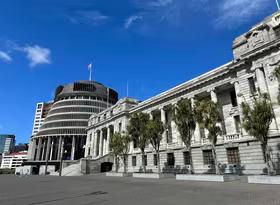Cat’o’nine lives or cat’o’nine tails?
Michael Cullen has delivered his eighth out of a likely nine budgets. Although we expect to only have to endure onemore, we are likely to face the consequences of his complex and prescriptive interference in the economy for many years to come.
The budget included a number of policies that should be positive for the economy:
- The reduction in the corporate tax rate from 33 to 30%
- The support for early childhood and primary education
- The moves to introduce a hypothecation of fuel excise taxes (i.e. dedicating fuel tax towards addressing transport-related issues)
But these few positives are outweighed by fundamental flaws in the government’s approach to economic management. In particular, it has a penchant to prescribe rather than promote individual choice. A natural result of this predilection for prescription is that policy becomes unnecessarily complex. Two obvious examples from this budget are the KiwiSaver scheme and the business initiative that accompanied the rate reduction.
If one really wants to encourage saving, one needs to discourage consumption. The obvious way for the government to achieve this goal is to simply raise the GST rate and/or reduce the tax on interest income. This would use the existing toolbox of taxes without the need for introducing a complex saving scheme. But raising the GST rate is too stark and obvious. The opportunity cost being imposed on people is too clear. It’s better to mask the costs via an oblique saving scheme that can be sold, via government bribes, as a form of government support.
At heart KiwiSaver is another form of tax. The only fundamental difference between the tax funded contributions to KiwiSaver and the tax funded Superannuation Fund is who manages the funds. Essentially the government is stripping you of your choice of how you use your income by siphoning money away until you are old. The only difference between New Zealand Superannuation, the Superannuation Fund, and KiwiSaver is who manages the money and how much return you receive. On that basis the Super Fund and KiwiSaver schemes are likely to provide a better return than the government does through the New Zealand Superannuation (which is limited to the pace of wage growth). But does this compensate you for your lack of choice to use your money as you would prefer? Consumption is ultimately what life is about — why should the government be prescribing when and how much we should spend?
The government’s business support initiatives are similarly prescriptive. On the surface support for R&D activities and developing overseas markets appear to be positive support for the business sector. But reducing the tax rate further would have been simpler, supported income growth wherever it comes from, and runs less risk of distorting the behaviour of business activities.
One of the government’s arguments for promoting saving has been to deepen local finance markets and thus promote growth through easier access to funds for local businesses. This argument represents highly flawed reasoning. New Zealanders have access to almost limitless credit through international capital markets. Deepening the local finance markets does not significantly expand this credit. Ultimately lowering the cost of credit requires borrowers to convince lenders that the perceived risks are lower. Improving the average returns from New Zealand investments is the soundest way of doing this. But with a focus purely on the amount of saving, a continued expansion of the government sector, and an increasingly complex regulation environment, there has been little in this budget to enhance the returns on investment in New Zealand.
Interestingly, The Treasury’s economic forecasts do not suggest much confidence in the ability of the policy initiatives to increase investment or economic growth. Indeed, the only impact seems to be to decimate private consumption growth. Treasury forecasts below 2%pa private consumption growth over the next four years — one has to go back to the depths of the early 1990s recession to have such a weak household sector. We dearly hope that they are wrong, but their forecasts do not signal confidence that the government’s policies will generate an economic transformation — at least not a positive transformation.




